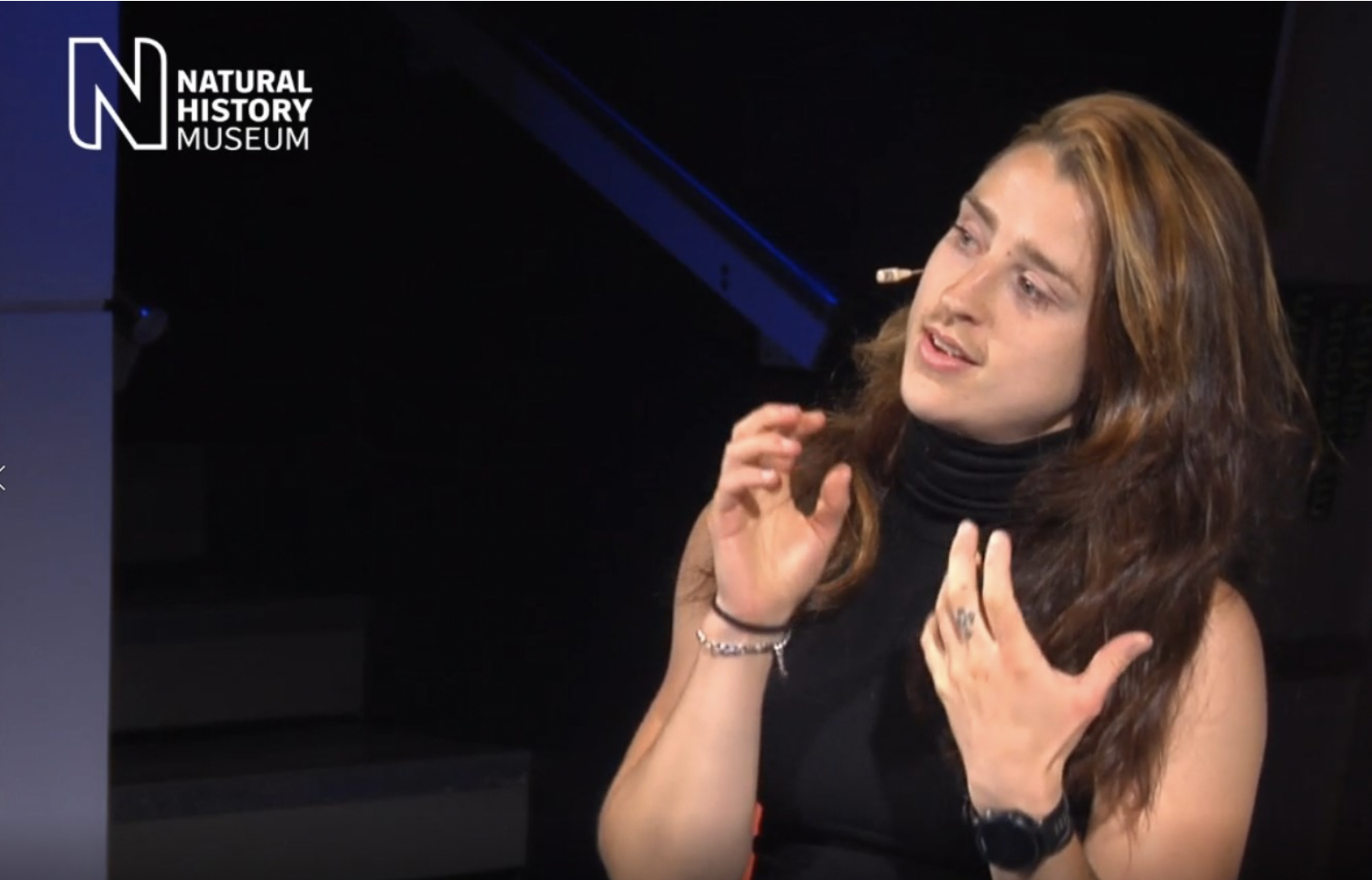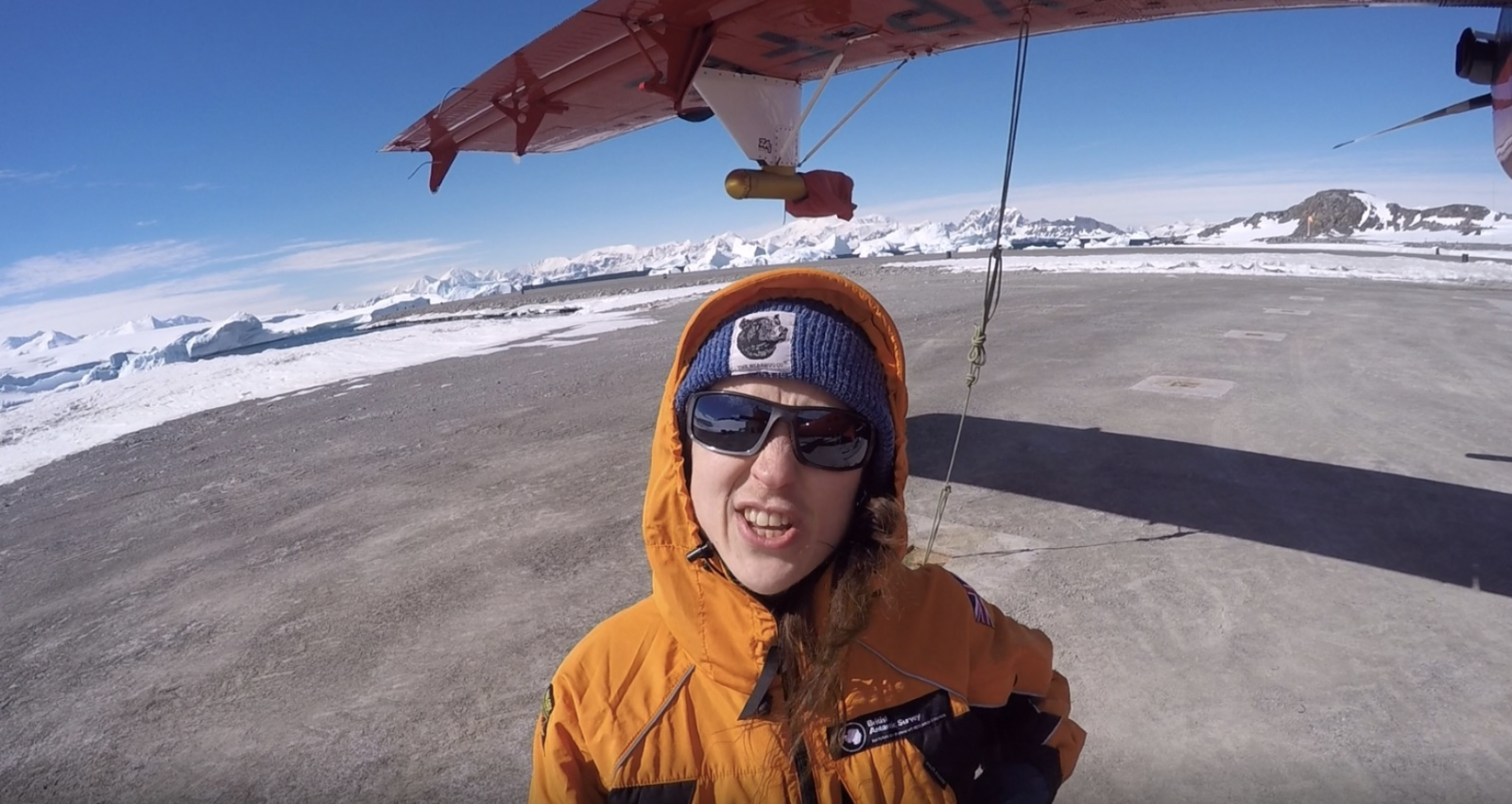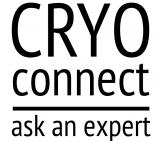
Here is Ella speaking at one of the Natural History Museum’s ‘Nature Live’ events in London, July 2019. [Photo Credit: Natural History Museum]
What inspired you to get into polar or cryospheric research? Perhaps it was a passion for the outdoors, a drive to protect the environment for the people and animals that live there, or a fascination with wild places. For me, it was all three – and the more I learned about Antarctic climate science, the more I realised that the polar regions are vital to the functioning of a healthy planet, and so should be important to all of us. In this blog, I give you six reasons why you should communicate your science and give you some tips along the way.
What happens in the cryosphere affects us all: from the impact of declining Arctic sea ice on weather patterns in the northern hemisphere or the effect of melting Himalayan glaciers on the water supplies of a billion people, to the potential contributions to sea level rise of the Greenland and Antarctic ice sheets.
One of my favourite quotes of all time is from Professor Sir Mark Walport, who at the time was Chief Scientific Advisor to the UK government. He said: “Science is not finished until it’s communicated”. For me, communicating science in a way that everybody and anybody can understand is one of the most important parts of the job. After all, if it affects everybody, everybody should be able to understand it, right?

Ella did some ’60 second science’ videos about the British Antarctic Survey’s airborne atmospheric measurements while she was in Antarctica during a field campaign in 2017. [Photo credit: Ella Gilbert]
Now, if you’re not already sold on the importance of science communication, I’m going to convince you why you should be, with six reasons.
One
First of all, there’s a moral obligation. I have been privileged enough to go to both poles and to some incredible mountain regions as part of my work. I am also lucky enough to be able to access the enormous wealth of literature on polar science and climate change, and to have the time and educational background to engage with it. I understand the scale of the problem, which can be a blessing and a curse. Knowing what I know, I could not stand by and keep this to myself. I feel it is my moral duty to shout from the rooftops about the importance of the polar regions, cryosphere and environmental change.
Two
Whether or not you agree with this, how about this for another argument: if you’re publicly funded, you should be communicating the results of your research with the people who paid for it – the taxpayers! And of course, not everyone has the ability to access pay-walled academic journals, nor the ability to understand scientific language and format. So it’s down to you to communicate accessibly, whether that’s in plain-language blogs, videos, podcasts, public talks, events or simply in the pub with your mates.
If you’re not doing it for others – then think of science communication as a way of developing your own work.
Three
A pretty famous scientist – one Albert Einstein – once said that if you can’t explain something simply, then you don’t understand it yourself. Synthesising and distilling the key points of your work into simple messages can be an excellent way to spot themes or even flaws in your work, and to increase your understanding of the subject. Very often, talking to the public can give you another perspective – perhaps asking questions from an angle you hadn’t considered before, or asking questions that you don’t know the answer to. We all have our expertise, and non-scientists often bring a refreshing alternative outlook that can help you develop your work.
Four
Communicating simply is also a great way of promoting yourself – just think, a paper in a journal reaches a relatively small but specialist audience within your field, but a blog post or online video has the potential to reach millions of non-scientists who might be interested in learning more about your research.
Five
Next, think tactically. Funding agencies are increasingly interested in creating impact beyond academia. If you can demonstrate that you have reach beyond the hallowed halls of academe, then you are more likely to win funding to continue your work. Outside academia, more and more employers are seeing science communication as a desirable skill, so you never know – that podcast might just get you a job too.
Six
The final – and possibly most important – reason to communication your science is that it’s fun! It’s incredibly rewarding, and you learn a huge amount by doing it.
So, what are you waiting for? Get out there and start communicating! Your first piece of science communication could be a guest piece for this very blog. Or, maybe your second, third or 100th piece of science communication could be writing for us… just get in touch with our editors.
Edited by Jenny Turton
 Ella Gilbert is a PhD student at the British Antarctic Survey. Her research focuses on the atmospheric processes that cause melting on ice shelves around the Antarctic Peninsula, and she regularly writes blog posts, makes youtube videos and communicates science at festivals, schools and museums. She tweets from @Dr_Gilbz and you can see more of her science communication at www.ellagilbert.co.uk or https://www.youtube.com/channel/UCjaBxCyjLpIRyKOd8uw_S4w.
Ella Gilbert is a PhD student at the British Antarctic Survey. Her research focuses on the atmospheric processes that cause melting on ice shelves around the Antarctic Peninsula, and she regularly writes blog posts, makes youtube videos and communicates science at festivals, schools and museums. She tweets from @Dr_Gilbz and you can see more of her science communication at www.ellagilbert.co.uk or https://www.youtube.com/channel/UCjaBxCyjLpIRyKOd8uw_S4w.



